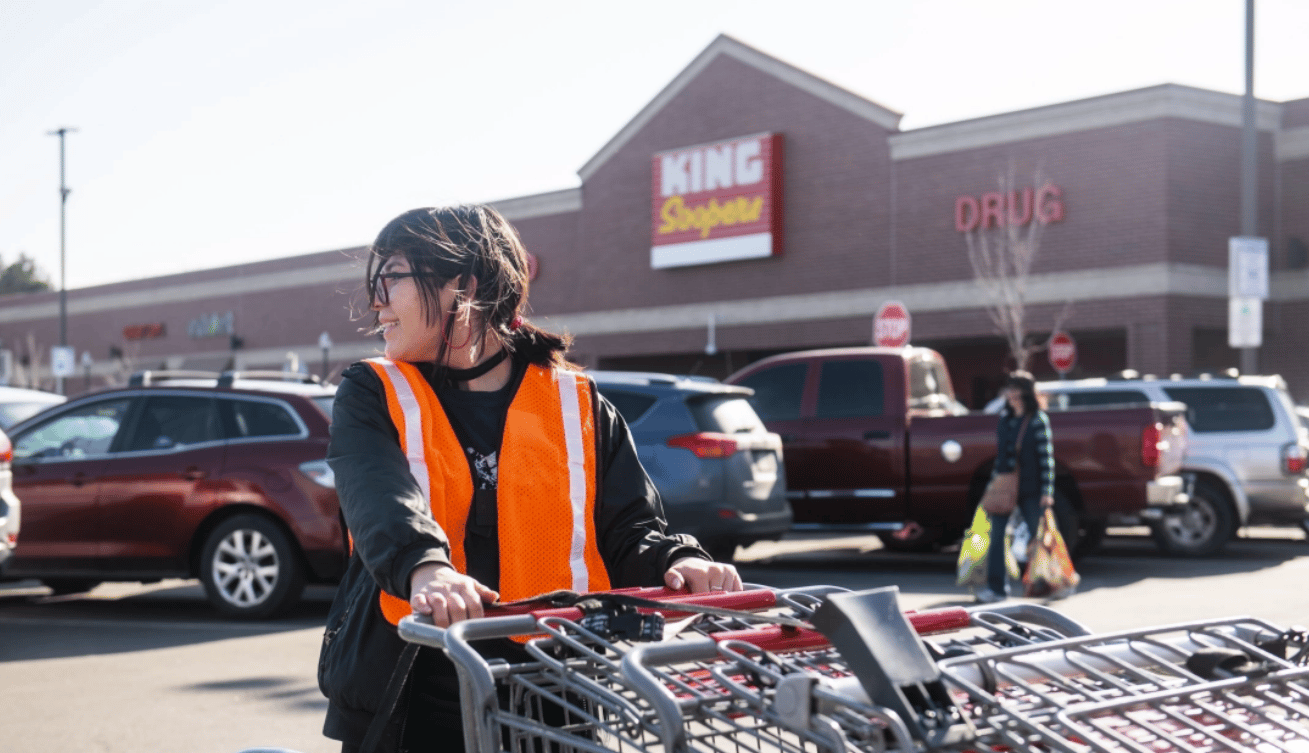
Kroger operates the King Soopers and City Market chains in Colorado. (Daniel Brenner/Special to The Denver Post)
King Soopers is hungry for more warehouse space.
The grocery brand, owned by Cincinnati-based Kroger, submitted plans to the city in mid-April proposing to add approximately 209,000 square feet of freezer and warehouse space to its already 651,000-square-foot distribution center at 10251 E. 51st Ave. in Central Park.
If completed, the total size of the building a mile north of Interstate 70 would sit at nearly 20 acres. The lot itself is 82.5 acres, per public records. Kroger owns the property.
Denver’s Galloway & Company Inc. is the architecture firm listed on the plans.
“We are still evaluating all of our options as we look to better serve our customers,” said Jessica Trowbridge, a King Soopers spokeswoman. Trowbridge and the grocer declined to comment further.
The plans come at an interesting time for the grocery brand. Kroger announced in October 2022 that it would acquire Albertsons, which owns Safeway.
In an effort to secure regulatory approval, the companies have said that 579 Kroger and Albertsons stores, including 91 Albertsons locations in Colorado, and eight distribution centers would be sold to New Hampshire-based C&S Wholesale Grocers in an effort to keep various markets competitive. The company did not specify where the eight distribution centers are.
Both the Federal Trade Commission and Colorado’s attorney general have sued to stop the merger.
The future of industrial buildings locally is generally bigger is better, according to one local broker.
“We’re now entering this world of delivery and e-commerce, and we need the big box warehouse to support those,” said Aviva Sonenreich, managing broker with the Denver brokerage Warehouse Hotline.
“We are 100 percent in uncharted territory right now. One-million-square-foot buildings didn’t exist 10 years ago.”
Much of that development will take place along I-70 and near Denver International Airport.
“I-70 is the bloodline of Colorado,” Sonenreich said. “And what you can expect in the next 10-15 years … from Denver proper to DIA, is all going to be built up. It’s all getting developed. It just depends on interest rates and the next development cycle.”
Besides logistics pressures, developers are constructing these warehouses due to their relative affordability to smaller ones. And they generally just build empty shells, as opposed to dedicated space for frozen goods.
“There is not enough of this product type in this town or really anywhere,” Sonenreich said.

Kroger operates the King Soopers and City Market chains in Colorado. (Daniel Brenner/Special to The Denver Post)
King Soopers is hungry for more warehouse space.
The grocery brand, owned by Cincinnati-based Kroger, submitted plans to the city in mid-April proposing to add approximately 209,000 square feet of freezer and warehouse space to its already 651,000-square-foot distribution center at 10251 E. 51st Ave. in Central Park.
If completed, the total size of the building a mile north of Interstate 70 would sit at nearly 20 acres. The lot itself is 82.5 acres, per public records. Kroger owns the property.
Denver’s Galloway & Company Inc. is the architecture firm listed on the plans.
“We are still evaluating all of our options as we look to better serve our customers,” said Jessica Trowbridge, a King Soopers spokeswoman. Trowbridge and the grocer declined to comment further.
The plans come at an interesting time for the grocery brand. Kroger announced in October 2022 that it would acquire Albertsons, which owns Safeway.
In an effort to secure regulatory approval, the companies have said that 579 Kroger and Albertsons stores, including 91 Albertsons locations in Colorado, and eight distribution centers would be sold to New Hampshire-based C&S Wholesale Grocers in an effort to keep various markets competitive. The company did not specify where the eight distribution centers are.
Both the Federal Trade Commission and Colorado’s attorney general have sued to stop the merger.
The future of industrial buildings locally is generally bigger is better, according to one local broker.
“We’re now entering this world of delivery and e-commerce, and we need the big box warehouse to support those,” said Aviva Sonenreich, managing broker with the Denver brokerage Warehouse Hotline.
“We are 100 percent in uncharted territory right now. One-million-square-foot buildings didn’t exist 10 years ago.”
Much of that development will take place along I-70 and near Denver International Airport.
“I-70 is the bloodline of Colorado,” Sonenreich said. “And what you can expect in the next 10-15 years … from Denver proper to DIA, is all going to be built up. It’s all getting developed. It just depends on interest rates and the next development cycle.”
Besides logistics pressures, developers are constructing these warehouses due to their relative affordability to smaller ones. And they generally just build empty shells, as opposed to dedicated space for frozen goods.
“There is not enough of this product type in this town or really anywhere,” Sonenreich said.
